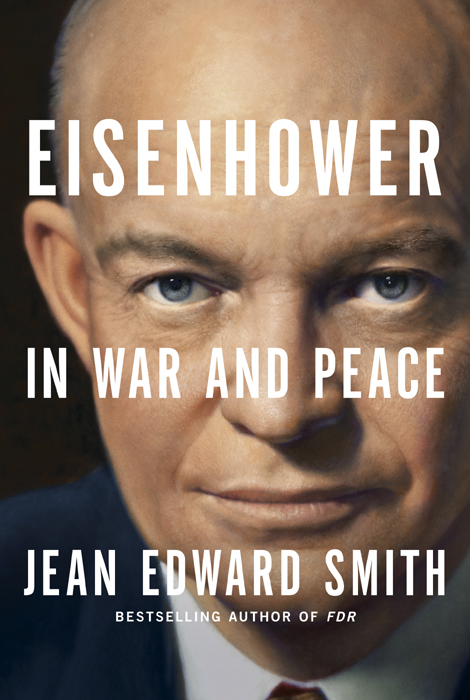
Eisenhower in War and Peace
کتاب های مرتبط
- اطلاعات
- نقد و بررسی
- دیدگاه کاربران
نقد و بررسی

Starred review from October 24, 2011
Except for FDR, Eisenhower was the 20th century’s “most successful president,” says Smith. After delivering this jolt, Smith, senior history scholar at Columbia (and winner of a Francis Parkman Prize for FDR) makes a reasonable case in this long but always engrossing biography. Eisenhower (1890–1969) spent 16 years as a major in the hidebound pre-WWII army, but the people who mattered (FDR, generals MacArthur and Marshall) recognized his talent. Smith describes a man who commanded the largest coalition army in history without grandiloquent posturing, feuds with superiors, or favoritism to certain egotistical subordinates who responded by disparaging his leadership. As president (1953–1960), Smith credits Eisenhower with leading Republicans away from their isolationist past, keeping the peace, and leaving office more popular than any successor. Ironically, no Republican candidate today would dare praise the legacy of this “progressive conservative” who slashed the military budget, opposed tax cuts, resisted evil (in this case communism) without going to war, and supported Social Security and federal aid programs. Warts turn up, but Smith portrays a genuinely admirable Eisenhower: smart, congenial, unpretentious, and no ideologue. Despite competing biographies from Ambrose, Perret, and D’Este, this is the best. Photos, maps.

November 15, 2011
One of the most favored subjects of eminent historians receives yet another lofty tribute as the prescient general and "most successful" president of the 20th century after Franklin Roosevelt. Having written biographies of FDR, John Marshall and Lucius Clay, Smith (History/Columbia Univ.; FDR, 2007, etc.) is amply qualified to reshape the life of the late, great president, whom the author calls an "enigma." The making of the leader seems to interest Smith most, and he breezily tracks Eisenhower's (1890–1969) early years as the third of seven sons born to a brooding, difficult father who finally found work at a creamery in Abilene, Kan., and a vivacious, energetic mother whose confidence in her sons' abilities propelled them to prosper in the world. Smith dutifully points out a few weaknesses in the general's legend, such as that he lied about his age when applying to West Point, and participated with alacrity in General MacArthur's shameful clearing of the Bonus Army encampment in Washington, July 1932. Popular, capable, ambitious and a hard worker if not a brilliant mind, Ike was furious that World War I had passed him by, relegated to the peacetime Army--although he leapfrogged the ranks while ingratiating himself wit the major generals of the day. Although he had never led an active command, he was swept into General Marshall's War Plans Division of the Army after Pearl Harbor. Smith examines Eisenhower's leadership in the European theater, concluding that he was a master at consensus and delegating, offering the appearance of casual confidence; however, as a field commander his understanding was "abstract and academic." As president, he capably handled the Suez crisis and sending troops into Little Rock, kept the country out of war and would not abandon his vice president Richard Nixon. He ended his presidency with the still-ringing warning about "the military-industrial complex." A straight-shooting, comforting account--though not super-enlightening, considering the mountain of previous Ike bios.
(COPYRIGHT (2011) KIRKUS REVIEWS/NIELSEN BUSINESS MEDIA, INC. ALL RIGHTS RESERVED.)

September 15, 2011
Leading biographer Smith, whose works include Pulitzer finalist Grant and FDR, a national best seller and winner of the Francis Parkman Prize, here revisits Dwight Eisenhower. She pegs him as one of the most successful Presidents of the 20th century, right after FDR. Solid.
Copyright 2011 Library Journal, LLC Used with permission.

November 1, 2011
Historian Smith avers that Eisenhower's accomplishments as a general and a president have receded from our understanding, although extant biographies by Stephen Ambrose, Carlo d'Este, Michael Korda, and Geoffrey Perret imply that readers still like Ike. Smith dwells primarily on Eisenhower's ascent in the army and how his military experience affected his presidency. A peripatetic narrative accordingly unfolds, pegged to Eisenhower's postings from West Point to Europe in WWII. Despite the seeming inevitability of Eisenhower's rise, Smith emphasizes the role luck played in his military career. He only received an active-duty assignment because an officer overrode a medical decision that Ike was physically unfit due to an old football injury. In 1921, a general quashed a court-martial recommended against Eisenhower. By then, his logistical skills, acceptance of responsibility, and gregarious personality had impressed superiors, a series of whom mentored and promoted him. Fortune smiled favorably, too, when Eisenhower bid for the White House, with Smith concluding that Truman had destroyed a damaging letter by George Marshall reprimanding Ike over his wartime liaison with Kay Summersby. As for Ike the chief executive, Smith hews to the hidden hand thesis that he tightly controlled his administration while cannily creating a different impression. Covering Eisenhower's marriage and relations with politicians, Smith rounds out a positive portrait that perfectly suits readers needing an introduction to Ike. HIGH-DEMAND BACKSTORY: Respected biographer Smith, whose works include Lucius D. Clay: An American Life; John Marshall: Definer of a Nation; Grant, a finalist for the Pulitzer; and FDR, a national best-seller, here revisits Dwight Eisenhower.(Reprinted with permission of Booklist, copyright 2011, American Library Association.)

























دیدگاه کاربران